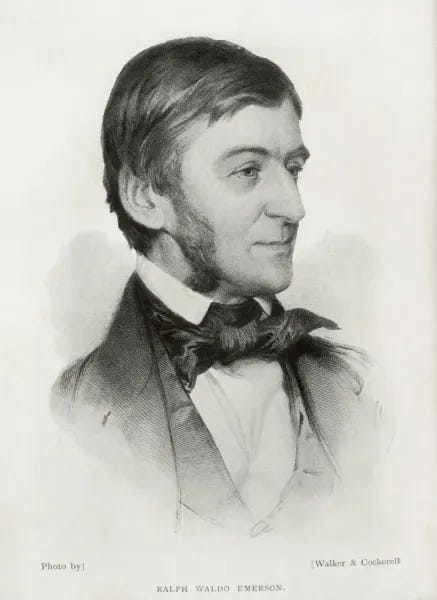The American Soul in Ralph Waldo Emerson
This article explores the profound impact of Ralph Waldo Emerson (1803–1882) on American philosophy, literature, and culture, particularly through the lens of transcendentalism. Emerson, a leading figure in this movement, championed themes such as self-reliance, individualism, and the mystical connection between humanity and nature. His work emerged during a transformative period in early nineteenth-century America, marked by significant social and political changes, which influenced his philosophy and reinforced his critique of societal norms.
Through essays such as "Self-Reliance" and "The American Scholar," Emerson articulated a vision for an American identity rooted in personal conviction and the intrinsic goodness of the individual, paving the way for a distinct cultural narrative that valued intuition and self-discovery over conformity to external authority.
Notable for his advocacy of individualism, Emerson emphasized the necessity of trusting one's inner voice and intuition as pathways to authentic existence. He famously stated, “What I must do, is all that concerns me, not what the people think,” highlighting the tension between individuality and societal pressures. Furthermore, his reflections on nature reveal a mystical connection between the natural world and the human soul, proposing that true understanding arises from a deep engagement with both self and environment. These core ideas not only contributed to the philosophical landscape of America but also influenced various social reform movements of his time, addressing issues like slavery and gender inequality through the lens of personal empowerment and moral responsibility.
Despite his lasting influence, Emerson's work has faced criticism for its perceived idealism and occasional disengagement from pressing social issues. Critics argue that while he celebrated self-reliance, he risked fostering a form of individualism that could lead to social alienation and an underappreciation of collective responsibility. Additionally, his ambivalent relationship with abolitionism and racial justice has sparked debate among scholars regarding the consistency of his philosophical ideals with his political actions. These controversies continue to shape the discourse surrounding Emerson's legacy, revealing the complexities of his contributions to American thought and identity.
In essence, "The American Soul in Ralph Waldo Emerson" encapsulates a pivotal chapter in the exploration of American ideals, showcasing how Emerson's philosophical inquiries into individuality, nature, and intuition resonate with contemporary discussions on identity and social responsibility. His legacy endures as a mirror reflecting the evolving values and challenges of each generation, ensuring his place as a central figure in the narrative of the American soul.
Historical Context
The historical context of Ralph Waldo Emerson's work and the transcendentalist movement is rooted in the transformative landscape of early nineteenth-century America. This era was characterized by significant economic, political, demographic, and territorial changes that reshaped the identity of the nation and its inhabitants. The optimism surrounding self-governance was juxtaposed with profound social conflicts arising from industrialization, which accentuated inequalities based on gender, race, and class.
Emergence of Transcendentalism
Transcendentalism began to take shape in the 1820s and 1830s in New England, emerging as a philosophical, spiritual, and literary movement. It promoted the inherent goodness of people and nature, positing that societal institutions often corrupt this purity. This intellectual response was not only a critique of the prevailing rationalist views but also a reaction against the mass democracy of Jacksonian America, which some, including Alexis de Tocqueville, described as a “tyranny of the majority.”
The movement was heavily influenced by European romanticism, which emphasized emotion and individuality over the cold reasoning characteristic of Enlightenment thought. Emerson and his contemporaries argued for nonconformity and self-reliance, which resonated with the era's sentiments of freedom and personal insight, paving the way for an exploration of the relationship between the individual and society in a rapidly modernizing world.
Intellectual Influences
The roots of transcendentalism can be traced back to various intellectual currents, including English and German Romanticism, as well as the transcendental philosophy of Immanuel Kant. Figures like Emanuel Swedenborg and Jakob Böhme also played pivotal roles in shaping its core ideas. Furthermore, the philosophy was an early articulation of American thought, highlighting the importance of subjective experience and intuition as opposed to objective empiricism, marking a significant departure from the established intellectual traditions of the time.
In this context, Emerson's writings served not only as a reflection of the beliefs held by transcendentalists but also as a critical examination of the moral and philosophical underpinnings of American identity during a period of profound change.
Key Themes in Emerson's Work
Individualism and Self-Reliance
One of the most prominent themes in Ralph Waldo Emerson's work is the concept of individualism, which he intricately ties to the idea of self-reliance. Emerson argues that true greatness lies in one's ability to maintain independence of thought and action amidst societal pressures. He famously asserts,
What I must do, is all that concerns me, not what the people think.
Ralph Waldo Emerson
This statement emphasizes the necessity of personal conviction over conformity to external opinions. This theme of self-reliance not only promotes personal authenticity but also encourages individuals to trust their inner instincts, which Emerson refers to as the "master light of all our seeing" and the "fountain of action and thought."
Nature and the Transcendental Self
Emerson’s relationship with nature is another key theme that underscores his philosophical stance. He perceives nature as a reflection of the divine and a pathway to understanding the self and the universe. In his essay "Nature," he proclaims, “the kingdom of man over nature,” suggesting that human perception can




